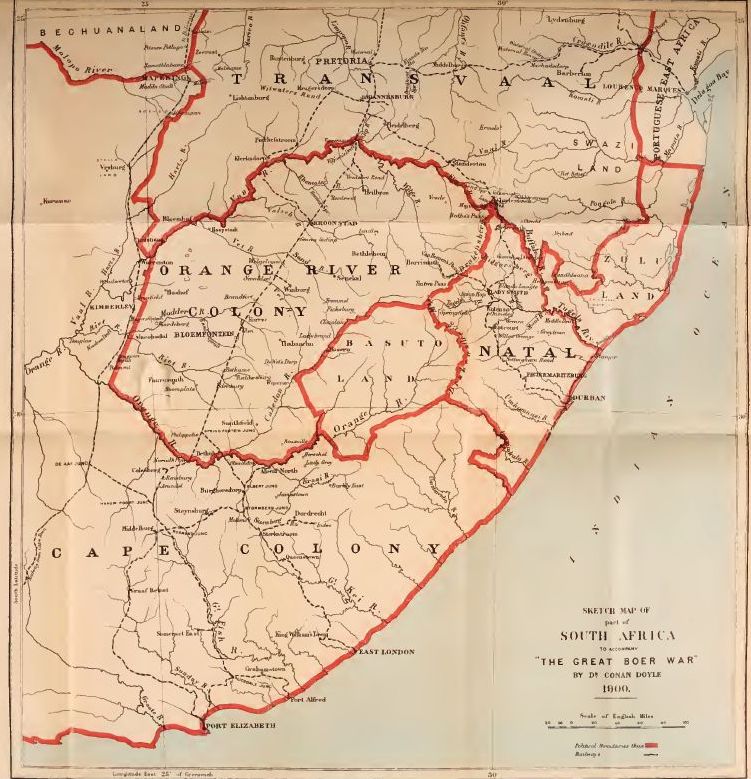Public sentiment in Canada soon proved too strong for what might have been in other circumstances a legitimate constitutional delay.
Continuing The Boer War,
with a selection from Canada; The Story of the Dominion by J. Castell Hopkins published in 1901. This selection is presented in 4 installments, each one 5 minutes long. For works benefiting from the latest research see the “More information” section at the bottom of these pages.
Previously in The Boer War.
Time: 1902 (ended)
Place: South Africa

Public domain image from Arthur Conan Doyle’s book in Gutenberg.org.
On October 2d, a few days before the war began, a large and representative meeting of militia officers was held in Toronto and the following resolution passed with unanimity and enthusiasm: “That the members of the Canadian Military Institute, feeling that it is a clear and definite duty for all British possessions to show their willingness to contribute in the common de fence in case of need, express the hope that, in view of the impending hostilities in South Africa, the Government of Canada will promptly offer a contingent of Canadian militia to assist in supporting the interests of our empire in that country.”
Meantime the matter had been under consideration, all the independent offers to serve from individuals or regiments had been forwarded to the Colonial Office, and each had received the stereotyped reply that, while negotiations were in progress, no further troops were required.
Public sentiment in Canada soon proved too strong for what might have been in other circumstances a legitimate constitutional delay. On September 27th Sir Charles Tupper, in a speech at Halifax, offered the Government the fullest support of the Conservative Opposition in the sending of a contingent, and, on October 6th, telegraphed the Premier to the same effect. The British Empire League in Canada passed a resolution declaring that the time had come when all parts of the Queen’s dominions should share in the defense of British interests, and the St. John Telegraph — a strong Liberal paper — declared, on September 30th, that ” Canada should not only send a force to the Transvaal, but should maintain it in the field.” The Montreal Star sought and received telegrams from the mayors of nearly every town in the Dominion approving the proposal to dispatch military assistance to fellow-subjects in South Africa. Mr. J. W. Johnston, Mayor of Belleville, represented the general tone of these multitudinous messages in the words: “It is felt that the Dominion, being a partner in the empire, should bear imperial responsibilities as well as share imperial honors and protection.”
No one in Canada expected the French Canadians to look upon the matter with the same warmth of feeling that actuated English Canadians; and very few believed that the absence of enthusiasm indicated any sentiment of actual disloyalty to the crown or the country. The people of Quebec had not yet been educated up to the point of participation in British wars and imperial defense; they were, as a matter of fact, in much the same situation that the people of Ontario had been in ten or fifteen years before. The influences making for closer empire unity could never in their case include a racial link or evolve from a common language and literature. The most and best that could be expected was a passive and not distinctly unfriendly acquiescence in the new and important departure from precedent and practice which was evidenced by the announcement, on October 12th, that a Canadian contingent had been accepted by the Imperial Government and was to be dispatched to South Africa.
There was no active opposition to the proposal except from a section of the French-Canadian press, edited by Frenchmen from Paris, and from a rash young member of Parliament who resigned his seat as a protest and was reelected by acclamation — both parties deeming it wisest to treat the matter as of no importance. The continued utterances of La Patrie, of Montreal, were calculated to irritate loyal sentiment and to arouse serious misapprehension among French Canadians.
However, the feeling of the country generally was too fervent to permit this obstacle having anything more than an ephemeral and passing influence. And any opposition that might exist among French Canadians assumed an essentially passive character. Toward the end of October an already announced pledge from an anonymous friend of Sir Charles Tupper to insure the life of each member of the contingent to the extent of $1,000 was redeemed, and on October 24th the following message was received through the Secretary of State for the Colonies: ” Her Majesty the Queen desires to thank the people of her Dominion of Canada for their striking manifestations of loyalty and patriotism in their voluntary offer to send troops to cooperate with her Majesty’s imperial forces in maintaining her position and the rights of British subjects in South Africa. She wishes the troops godspeed and a safe return.”
| <—Previous | Master List | Next—> |
Arthur Conan Doyle begins here. James F.J. Archibald begins here. J. Castell Hopkins begins here.
More information here and here, and below.
We want to take this site to the next level but we need money to do that. Please contribute directly by signing up at https://www.patreon.com/history

Leave a Reply
You must be logged in to post a comment.